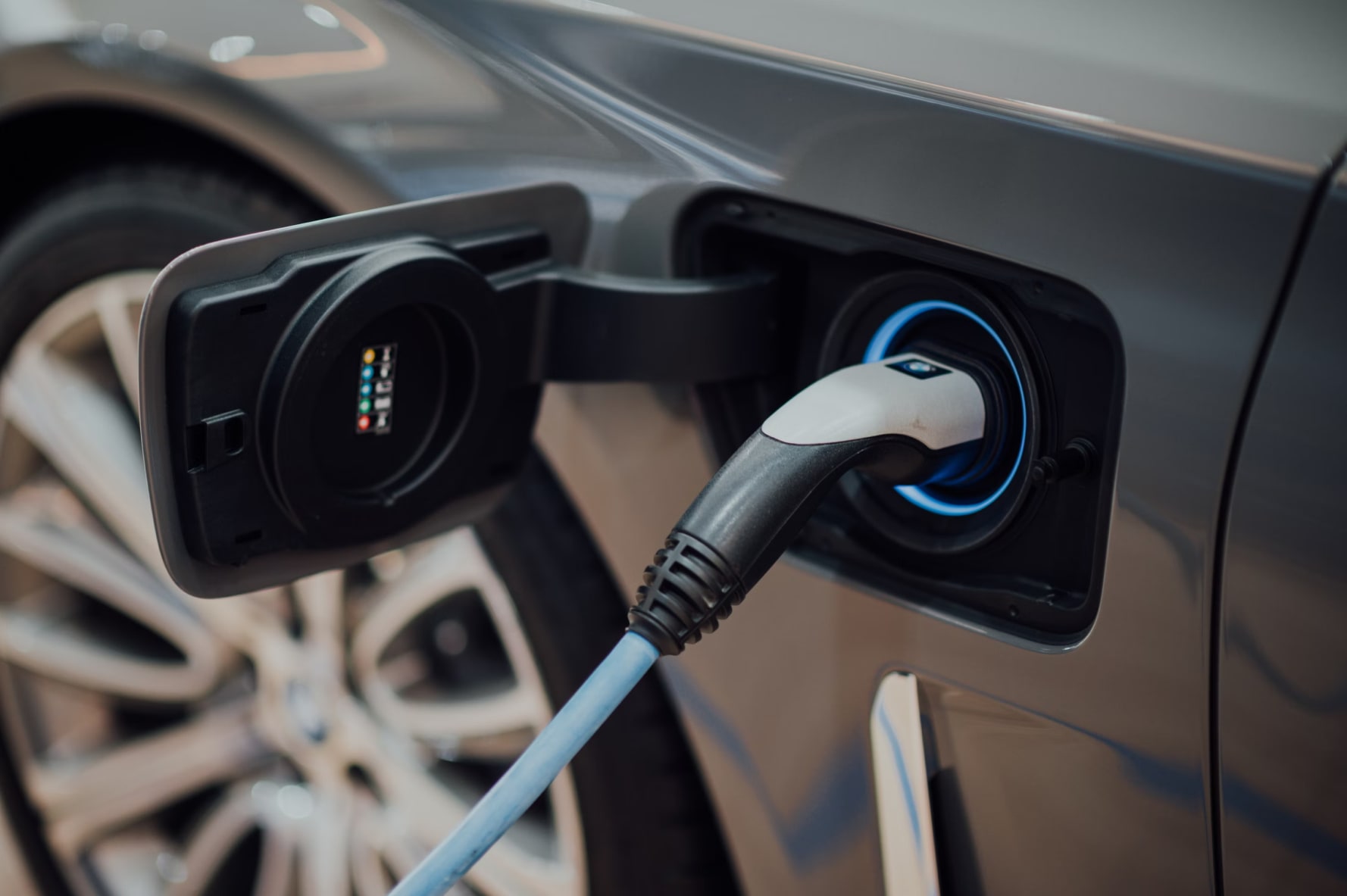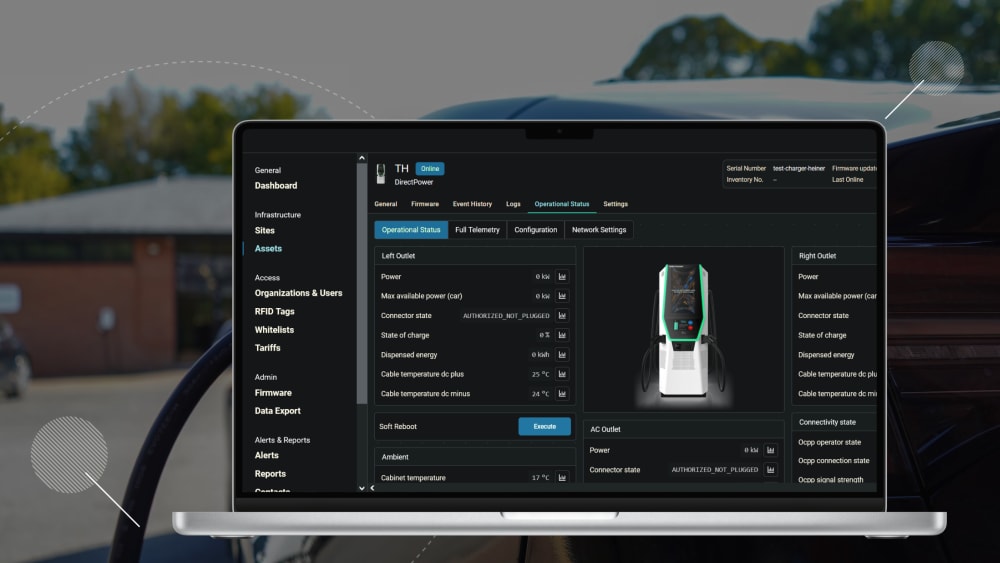Case Study: High-Powered Electric Charger App for a Leading Manufacturer
Electric Vehicles (EVs) are gaining momentum as a cleaner option in transportation. However, to truly unleash their potential, a solid charging infrastructure is needed. Recognizing this need, a global technology leader planned to launch a high-power EV charger network in the U.S. and European markets. But a key factor was missing – reliable software for the EV charging network, based on trustworthy cloud infrastructure. Boldare stepped in to help, bringing its digital transformation expertise to the table.

Table of contents
The Client
A global conglomerate comprising over 300 companies, this client is renowned for its extensive expertise in motor manufacturing, covering a wide range of applications from small to large. As one of the world’s leading suppliers of complete electrical packages, their specialized division focuses on electrical power and control systems, electric motors, and high-quality power components. Already established in the U.S. market, this company recently decided to enter a new segment by introducing high-powered electric chargers, an ambitious project that required solid technological support. To achieve this, they hired Boldare, which carried out the project under the guidance of a specialized division based in Germany.
Legal and Economic Background
To respond to the growing demand in the U.S. market, our client aimed to introduce its electric vehicle (EV) charging system. According to McKinsey, the electric vehicle (EV) market in the United States is rapidly expanding, fueled by substantial funding and the goal to decarbonize the power sector by 2035. The Bipartisan Infrastructure Law (BIL) allocates $7.5 billion to develop EV-charging infrastructure, aiming to install 500,000 public chargers nationwide by 2030.
To meet future demand, the U.S. will need around 1.2 million public chargers and 28 million private chargers. The EV fleet is expected to grow from fewer than three million vehicles today to over 48 million by 2030, making up about 15% of all vehicles on U.S. roads.
Most chargers will be installed at residences, but the significant need for public chargers at various locations will be crucial to supporting this growth. Tesla, a well-known player in the EV market, has already established its Supercharger network, leading the way in public charging solutions. However, other companies are eager to secure their place in the market and are investing in their own charging infrastructure.
Similar investments are underway in Europe, where expanding EV charging infrastructure is also a priority to support the growing number of electric vehicles.

The Challenge
The client faced a significant challenge: developing a reliable system for managing a fleet of high-powered electric vehicle (EV) chargers. This system needed to be capable of monitoring alerts, charger statuses, and energy consumption, all while ensuring compliance with U.S. laws and regulations. Furthermore, the system required efficient management of the chargers’ firmware to facilitate seamless operations.
With these needs, the client sought a partner who could not only provide the technical expertise but also ensure everything was delivered within a specific timeline, as the competition wasn’t sitting idly by. The client aimed to align with its strategic goals of rapid deployment and compliance in a highly regulated market.
The Solution
Boldare partnered with a leading technology company to co-develop a specialized app, an application designed to oversee the administration of charger fleets for B2B clients, such as charger fleet administrators. In parallel, Boldare also implemented the user-friendly front end of the charger panel aimed at end users.
To summarize, our collaboration involved two areas of work on the high-powered electric charger system:
- B2B: Co-developing the app for charger fleet administration (for B2B clients, such as technicians and operators installing and maintaining chargers).
- B2C: Designing the frontend of the charger panel for the end user (B2C) — the person who charges their electric vehicle and uses the charger panel.

Key features of the fleet management app include:
- Real-time Monitoring: The app allows partners to view the locations of the chargers and monitor their parameters live. This feature is crucial for ensuring the chargers are operational and that any issues are promptly addressed.
- Regulatory Compliance: The app ensures that all operations align with U.S. regulations, a critical component for avoiding legal pitfalls and ensuring the safety and reliability of the charging stations.
- Firmware Management: The app facilitates easy updates and management of the charger firmware, enabling the fleet to remain up-to-date with the latest features and security measures.

Approach
Boldare employed a comprehensive approach, starting with a series of workshops to understand the client’s specific challenges and needs. These included an Introduction to Agile Workshop and a Product Discovery Workshop, where the teams collaborated on mapping the product vision, setting goals, and defining success criteria. Boldare also utilized service mapping and Event Storming techniques to gain a deep understanding of the client’s business operations and technical requirements.
Team Composition and Collaboration
The project saw a strong collaborative effort between Boldare and the client, with the Boldare team comprising two frontend developers, two backend developers, a DevOps engineer, and a Scrum Master. The client’s team included designers, full-stack developers, and a Product Owner. The teams worked in Scrum, facilitating regular communication and iterative development, ensuring that the product evolved dynamically to meet the client’s needs.
Technologies Used
The project utilized modern technologies such as Python for backend development and Vue.js for frontend development, chosen for their robustness and scalability in building complex applications. The application was hosted on Azure Cloud and leveraged Azure native technologies, such as IoT Hub, for connecting and managing devices across an entire region (e.g., Europe).
For hosting backends, we chose Container Apps for easy scaling and seamless integration with Azure monitoring and alerting tools, as well as built-in Front Door support. The frontend was deployed to SWA with an enterprise-grade edge.
As data security was a major concern, we deployed all resources into a VNET and relied on Private Links and IPSec connections to keep data transferred between physical devices and Azure services on Microsoft’s backbone network. Infrastructure was defined as code in Bicep, and we used Azure DevOps as our CI/CD tool.
Results
The collaborative effort resulted in an application that complies with the legal and regulatory requirements of the EV charging industry while managing the chargers’ firmware updates. The application bridged the gap for station operators, integrating seamlessly into the company’s existing environment.
The partnership with Boldare allowed the client to sell fleet chargers to its partners, who have successfully installed them along highways across the U.S. The fleet management app provides partners with real-time insights into the status and performance of each charger, significantly enhancing operational efficiency and reliability.
Share this article:








